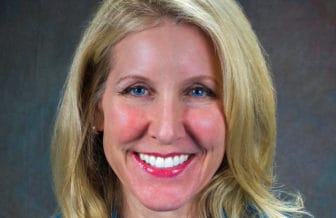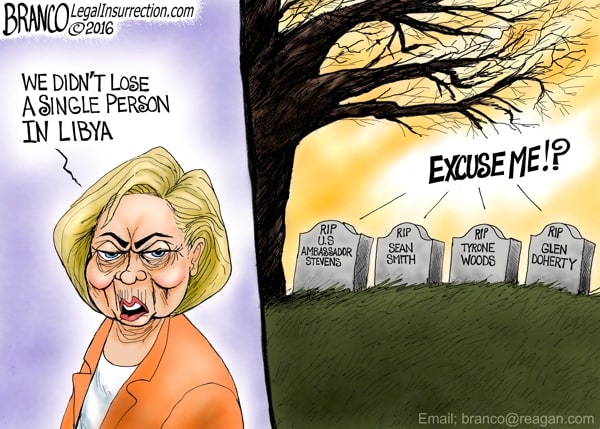COMMENTARY: This presidential election year is comparable to 1828 – the “dirtiest ever” – and for much the same reasons: internal party conflict and a bombastic fisticuffs-inclined candidate (the incumbent Andrew Jackson); one candidate appealing to the “common folk” and another to the elitist, white New England establishment; and, the hurling of accusations of adultery, use of prostitutes, and improper use of government funds. Sound familiar?

Courtesy photo
Elisabeth Miller
I’ve almost abandoned looking at Facebook; it’s full of purple-prose political memes (e.g. Clinton, Sanders, Trump, Cruz) and ad hominem attacks betraying the sad fact that apparently many people take the easy rhetorical route rather than thinking about the issues at hand and just why they consider themselves a Democrat, Republican or Libertarian, or a liberal, progressive or conservative.
Truly, if you cannot articulate what the label you give yourself means, then why are you so meme-proud of it?
Political cartoons, on the other hand, mock in a funny or Schadenfreude way that draws attention to an hypocrisy or some detail left unsaid. This too is a rich American tradition. In some ways, political cartoons work like ugly memes. If you agree, they make you laugh. If you don’t, you just think its unfunny and perhaps partisan. But in other ways, political cartoons are an important way to keep things honest. They serve a critical function in reminding us all of those things that are ignored in service of framing an issue positively for political gain.
Today, I saw this political cartoon that sent me back to 2012:
It’s true, Hillary Clinton said that statement verbatim. And she said it when referring to the 2011 U.S.-backed overthrow of the Libyan dictator Muammar Qaddafi. In other words, it is a true statement. But simultaneously disingenuous, because, on Sept. 11, 2012, four Americans – three U.S. Foreign Service officers from our Department of State and the ambassador to Libya, Chris Stevens – were killed in Benghazi by terrorists (rebel forces perhaps if you’re Libyan) in a country destabilized by our military intervention in 2011.
I, too, was a Foreign Service officer at that time and had the privilege of attending 7th floor events at Main State (aka HST) in Washington, D.C. where then-Secretary Clinton often spoke. One event that resonated with me was in support of Amelia Earhart. There Clinton repeated an oft-told story about receiving a letter from NASA written in response to her adolescent desire to become an astronaut. The response she received? A polite letter telling her that women just could not do that.
Whether true or merely allegorical, if you want to consider what may have influenced Clinton’s brand of feminism, it may just be that. We forget today what it was like then; even the State Department as late as 1970 expected their own female Foreign Service officers to resign if they married (and men’s annual reviews still rated them on how well their wives planned a party).
And I have to say, whenever I witnessed Clinton speaking with/to State employees, she was unfailingly warm, open, smiling, and encouraging. I suspect that’s the Clinton who inspires such dogged loyalty among her close circle of friends and advisors. Like pundits say, it “humanized” her to me. At the time, I – a conservative – actually mused, “hmm, maybe I could vote for Clinton one day.”
And then Benghazi happened. I never had the privilege to meet Ambassador Stevens, although I knew who he was because much was made of re-opening the U.S. embassy in Tripoli and his return at the helm. I was also aware about the security aspect of the return because, at the time, I was friendly with many of the State Department Diplomatic Security special agents sent to assist with the reestablishment of the embassy and to provide on-going protection for staff and the ambassador. They all enjoyed working with Ambassador Stevens and told me stories about what a stand-up guy he was.
It’s a big stretch to blame Clinton for the Benghazi attack. While yes, she was leading the State Department, the Bureau of Diplomatic Security is a big bureau and when it is in-country, it generally has to work with the Department of Defense or the CIA if they are too. And in the tussle of who is top dog, Diplomatic Security usually loses out to the other two.
But then, out of the congressional inquiry we learn about Clinton’s use of both personal email and personal server. Without a doubt, she willfully ignored State Department policy, and she endangered staff in the field by sharing both classified and “sensitive but unclassified” (SBU) information. It seems that Clinton, her State circle, and those outside of State were freely discussing classified and SBU information routed through an off-site server without any security controls as set by State, making it even more vulnerable to hacking.
Here’s the deal: when using the State Department’s email system, it is possible to mark the classification of all emails personal, unclassified or SBU. The latter is still considered close-hold because while each fact may not be classified, if combined they can ladder up to a classified fact. This system is known as Open Net and works like your own Gmail account (including keyword scanning by State to maintain SBU compliance). Classified emails are sent on a self-contained system. Thus, if someone was emailing actual classified information on the Open Net, it was deliberate. If an email was marked classified retroactively, it’s because it was SBU information that now that other facts are known, becomes part of a classified whole – and State employees are supposed to be aware of this possibility and take it into account with their emails.
To me it’s irrelevant what former secretaries did since State’s email system didn’t exist in the same format during their tenure. Clinton was the first who had this full option and she ignored it.
Instead, with intent, she shielded herself from regular oversight and record-keeping. Had I done either of those things, my clearance would’ve been yanked, I would have been terminated, and I would’ve been prosecuted and served at a minimum probation.
My personal opinion is that she did so in service of her political ambitions, thinking that if she could keep her emails away from FOIA (Freedom of Information Act) requests, NARA (National Archives Records Administration) compliance, and internal controls scanning, she could tamp down on leaks and manage her image better for her presidential campaign. It is my understanding that per NARA, the expectation is if personal email is used, then it should be forwarded to an official government account. Clinton waited until she departed the State Department to do this, but then did not turn over what we’re all looking at now until the Congress forced her hand and demanded it.
It’s a bit of irony that what she did instead meant that more of her emails have been publicly shared than would have been done otherwise. And I think that Clinton should be dealt with in the same manner as Former Gen. Petraeus. Though I doubt that will happen prior to the election. I suspect that if there is any indictment before November, the immunity granted to Bryan Pagliano will result in a charge against either Huma Abedin (Clinton’s deputy chief of staff and senior advisor) or Cheryl Mills (Clinton’s chief of staff) because most had to email either of them to get to Clinton (another key learning from the public email release).
Your behavior, not your words, tell people who you are; and past history is future character. The media to date have done a poor job explaining the serious nature of what Clinton did. It’s disheartening to me that there are voters who support a potential commander-in-chief who, with intent, broke the law, ignored the policies of her own agency that others would have been fired for doing, and displayed a habit of being careless with critical information. Democrat or Republican, we Americans all deserve better.
Elisabeth Miller is a seasoned communications and government relations expert whose guidance has been relied on by public, private and government organizations alike. She holds a Ph.D. in political science from Claremont Graduate University. Her areas of expertise are issue/crisis management, immigration law, and border issues. Most recently, she was a diplomat with the U.S. State Department serving in Ciudad Juárez. Currently she serves New Mexico as a citizen member of the N.M. Law Enforcement Academy Board. She moved to Las Cruces in 2015 when her husband opened Miller Guns & Ammo.
